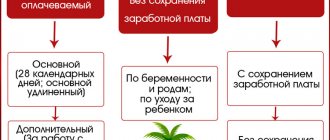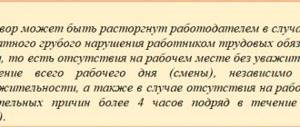All working citizens have the right to rest, which is expressed in the form of weekends and vacations.
Vacations by law have a strict time limit, which is regulated by law and directly depends on the employee’s field of activity. The employer is obliged not only to provide annual rest, but also to pay for it based on the average individual income of the employee.
There are special categories that, due to age, health or marital status, are also entitled to additional days of rest, called social leave. This rest period also has time limits.
Definition of the concept
First, you need to define what social leave is (hereinafter referred to as social leave, SO). This legal category refers to the provision of additional days of rest to citizens, which are used to exercise social rights.
The Labor Code of the Russian Federation (hereinafter referred to as the Labor Code of the Russian Federation) does not contain the concept of social leave. However, certain rules regulate the concept. Various provisions of the Labor Code of the Russian Federation establish conditions that allow a person to be released on additional rest in connection with certain circumstances.
Therefore, social rest is called the days on which a person is freed from work in order to satisfy needs in part:
- raising children;
- treatment of a personal health condition;
- obtaining knowledge and qualifications, etc.
The list is not closed, since the reasons for granting leave may vary among citizens.
What are the differences between regular and social holiday periods:
- The purpose of the CO is not to relax, but to fulfill a specific social mission.
- Social leave does not include the concepts of length of service, type of work or profession.
- CO is paid according to the rules established in the legislative acts of Russia or the collective agreement of the enterprise.
- Social leave is provided regardless of annual leave and cannot replace it.
- The employee also has the right to choose the period of time off at his own discretion.
- Rest time is counted in calendar days, not working days.
- Unlike the main one, social leave cannot be transferred to the next year; its days are not summed up with the next year, but expire upon completion of the current one.
- Employees are not entitled to financial compensation for unused CO days.
Initiating the provision of CO is the exclusive right of the employee; the employer cannot force a person to take time off under duress.
Types of vacations and days off
According to letter No. 14-2/OOG-9754 dated December 7, 2019, the Ministry of Labor prohibited the registration of vacations exclusively for weekends. This fact is classified as a violation and is fined in the amount of 30 thousand to 50 thousand rubles - for organizations, from 1000 to 5000 rubles. for individual entrepreneurs.
Annual paid holidays in accordance with Articles 114,120, 130 of the Labor Code of the Russian Federation are calculated in calendar days. The employee retains his job and average earnings for the entire period of absence. If the vacation covers weekends, then payment is calculated on an equal basis with working days, based on earnings.
What types of social leave are there?
Depending on which entity requests the provision of CO, its varieties are also distinguished.
To begin with, we should name the criteria that must exist in order to become eligible to demand time off for social reasons:
- Availability of official employment.
- The person must belong to the group of citizens who are legally entitled to CO.
If at least one of these conditions does not exist, then leave is not allowed.
Does not matter:
- what employer the person is employed by;
- position and type of activity;
- seniority.
The factors listed are not of great importance when requesting leave.
Depending on the reason for which leave is issued, types are divided into leave according to:
- caring for children under 18 years of age;
- treatment and restoration of health in case of disability;
- pension reasons;
- getting an education;
- marital status;
- and also if a person in the family died who was performing professional duties or civic duty.
For each type of social leave, the law sets its own duration.
As with annual leave, an employee can count on maintaining his job. As for social holiday pay, they will be received only by those workers for whom such payments are provided for in the local acts of the enterprise.
Maternity leave
Maternity leave is usually considered the most common type of such leave. Any pregnant woman can receive it. At the same time, the enterprise where she works is not only obliged to provide her with rest, but also to pay for it. A woman can go on maternity leave if she is at least 30 weeks pregnant. To obtain it, she must provide her superiors with the appropriate documents confirming that she is currently expecting the birth of a child. As a rule, these include sick leave issued by a medical institution and a statement from an employee. The duration of maternity leave is established by labor legislation and is 140 days. However, if pregnancy occurs with some complications, then it can be increased. For example, with multiple births. Then a woman can be on maternity leave for up to 194 days.
The decree relates to paid social leave, that is, the employer is obliged to pay the woman a certain amount, which will depend on the current salary of the expectant mother and length of service. At the same time, the boss will not be able to fire or lay off her during her vacation. And after the birth of the child, he is obliged to provide the woman with a job with a salary that will not be less than the previous one.
Social leave for family reasons
The most common SB in terms of nuances in marital status is maternity leave and the one preceding it for pregnancy and childbirth.
The law establishes that a woman is entitled to payment for such days. The period associated with childbirth and pregnancy is not considered maternity leave; it is a period when the employee has limited ability to work and cannot perform functions due to health reasons. In this case, this period is paid as regular sick leave. It is important that the woman is officially employed. After the expiration of sick leave, the employee has the right to return to work or write an application for maternity leave.
Maternity benefits are paid by the state in an amount that is set depending on the employee’s salary. If the mother had no income, then she is entitled to a minimum guaranteed amount.
The father can also receive a five-day exemption when the child is born. The duration may vary depending on the rules established in the collective agreement or other local acts. For such days the employee is not entitled to compensation.
After the child has reached the age of three, the parent must leave maternity leave, but since the baby is not yet an independent member of society, some parents are entitled to another 14 days annually for additional care.
The Labor Code of the Russian Federation stipulates that an employee is entitled to two weeks of assessment:
We recommend you study! Follow the link:
The concept and procedure for drawing up an employment contract between an employer and an employee
- if he has two or more children who are under 14 years old;
- who is supporting a child with a disability;
- if a parent is raising a minor under fourteen years of age alone.
These are legal deadlines that are guaranteed to every citizen, but the employer has the right to extend them at his own discretion.
Upon receipt of education
By acquiring new knowledge and gaining qualifications, a citizen becomes useful in society and the state.
Therefore, the authorities are trying to create the most favorable conditions and not interfere with the educational activities of students. Providing students with social leave is a manifestation of such assistance. The duration of the assessment depends on the educational institution in which the citizen is studying and what actions he performs.
Thus, CO is provided for a period of time:
- entrance exams;
- off-season sessions;
- final exams;
- defense of theses.
The employer cannot interfere or not give time off for study.
According to the law, the employer gives fifteen calendar days to the employee for the period:
- Preparation and passing entrance tests.
- To attend preparatory classes for passing final exams.
The list is closed.
For persons studying in a day hospital, the following is required:
- fifteen days for streaming sessions;
- one month to prepare and pass state tests;
- four months to write a thesis and defend it.
The list is exhaustive.
Persons who study in the correspondence department are given:
- In the first two courses – forty days annually to appear at sessions.
- If a student has a shortened or accelerated program, then in the 2nd year the person receives 50 days.
- In other years of study (after the second year) – 50 days annually.
- 4 months are allotted for state exams, writing and submitting a thesis.
A student has the right to receive compensation for vacation days in case of good studies and if the form of study is full-time or part-time.
In case of disability and retirement age
Disabled people who belong to the first and second groups have the opportunity to work.
If a person has a disability, this means that his health status has serious, permanent impairments. Disabilities are distinguished:
- permanent – fixed in a person who has been diagnosed with lifelong dysfunction in the body;
- temporary - a person is given some time to restore health.
The type of disability does not affect the issuance of a certificate. Every disabled person has the right to social leave in the amount of 60 days, in addition to the annual one. A person can spend this time on prevention, rest, undergoing a medical examination or other procedures to improve their health. To receive rest, the employee does not have to provide additional information (for example, about the need to undergo an examination); one expression of will is sufficient.
Working citizens of retirement age can count on an additional vacation of two weeks. The legislator proceeds from the fact that in old age it is more difficult for citizens to cope with responsibilities, therefore pensioners need more time to rest.
Under personal circumstances
Leave for personal reasons does not provide compensation. This rule is enshrined in Art. 128 Labor Code of the Russian Federation. The duration of social leave in this case depends on the agreements of the parties.
The important point is that the employee must justify the request with specific, valid circumstances. If the employee does not have evidence of the seriousness of the situation, the employer has the right not to sign the application.
However, there are circumstances in which the legislator obliges the employer to provide CO; they are provided for in Art. 128 of the Labor Code of the Russian Federation and are as follows:
- If an employee enters into a marriage relationship (wedding).
- If an employee has a child.
- If a close relative has died - for preparation and conduct of the funeral.
The duration of such leave can be up to five days, but the employer can reduce this time.
What is social leave?
The direct term is found in labor law. This refers to leave granted to all categories of employees. Experience, place of work, job responsibilities do not matter. The name “social” emphasizes the targeted nature of the vacation period. We are talking about a citizen’s solution to certain issues or the presence of family circumstances when actions cannot be performed in parallel with work. In most cases, this is not related to illnesses and health problems, since they fall under the category of “temporary disability” and are separately prescribed by law.
Typically, such leave is planned (for example, to pass a student exam) or is suddenly requested due to force majeure circumstances. Regardless of this, management is obliged to satisfy the request, and if it does not comply, the employee has the right to appeal to supervisory authorities. The social status of a particular citizen does not matter; if there are good reasons, everyone is entitled to leave. Its period and registration procedure may differ.
Legislative regulation
The legislation does not contain a specific article regulating the grounds for this type of leave and the procedure for its provision. Separate provisions are spelled out in several legal acts, which together make it possible to distinguish social leave from a number of other periods of temporary absence from work. In each case, the need to provide the employee with a certain period of time required to solve certain problems or restore the body is indicated.
Attention! One example is Art. 128 of the Labor Code of the Russian Federation, which indicates the right of management to grant employees leave for personal reasons. The period is not specified, everything is based on the agreement of the parties. The article emphasizes that wages are not paid for such periods.
Types of social leave
The general list of types of leave that are determined by a specific reason includes:
- Paid types;
- Unpaid types.
We are talking about generalized categories that reflect the nature and duration of a time period. In some cases, provisions are specified in the parties' employment agreement. This agreement is decisive, but cannot contradict the legal requirement. Sometimes leave requires the consent of superiors, in other cases it is granted upon the occurrence of an event.
Paid social leave
Regardless of the reason, such absence from work presupposes that the employee retains his position. Regarding payment, in several cases it is required:
- Decree;
- Study at evening or correspondence courses.
Otherwise, organizations can set their own rules, deciding whether to compensate employees for forced absence or not.
Maternity leave is the most common type of social leave, guaranteed to all women expecting a child without exception. They can make a corresponding request after 30 weeks of pregnancy. Management is provided with medical certificates and other documentation. The standard duration is 140 days, sometimes (in case of complications) the period increases to 194 days.
It is important to know! Payment is required, but its size depends on several factors: primarily the salary and work experience of the recipient. Reduction of position and dismissal are excluded, followed by strict disciplinary measures and bringing the situation to the status quo.
After the birth has taken place, another type of social leave is provided - “care leave”. It is paid until the child reaches 1.5 years of age. Then the woman can (if she wishes) extend her vacation for another 1.5 years, but there will be no payments during this time. The exception is cases of family attitudes towards large families or low-income categories. A father can also arrange a similar vacation when his wife, for one reason or another, prefers to work.
By law, vacation related to an employee’s studies is paid. It does not matter whether we are talking about the first or second education, as well as its specifics (higher, secondary). The frequency varies from several days to months, as agreed between the parties. The longest period applies to situations where a citizen writes a dissertation. Typically, this time is also paid, since work is expected in the educational field and related activities. Registration of such leaves is carried out after the provision of certificates from the educational institution confirming the part-time or evening nature of the studies. The employer is not required to pay for full-time training.
Unpaid social leave
With regard to social leaves that have a specific purpose (with the exception of part-time studies) or caused by force majeure, then, as a rule, payment for them is not provided.
The legislation does not provide an approved list, but usually the funeral of a close relative is included among the circumstances. We are talking about spouses, parents, children, as well as second-degree relatives (grandparents, grandchildren). The average duration of such a vacation is about 5 days. There is no payment provided, but the employment contract may stipulate compensation, or the organization, on its own initiative, provides financial assistance to the person. A supporting document is required for registration. It is not always required; in most cases, a simple statement from the employee is sufficient.
Similarly, leave is given when a wedding is planned. 3-5 days are allotted for preparation and the event itself. Sometimes this is not enough and the management of the organization, meeting the employees halfway, extends the period to 10 days. Registration is carried out before or after the event, a certificate from the registry office is presented as confirmation. There is no official payment, but management may also provide financial support to the employee.
It is important to know! When the pregnancy of a wife or daughter ends with the birth of a child, his father, grandmother or grandfather can take social leave for up to 5 days. Payment in such a situation is also not provided.
Duration
The reasons why citizens take social leave, their nature and legislative regulation, also determine the time periods. For example, during pregnancy it is 140 (194 for complications) days, but this is the only case where there are clearly established limits. Studying depends on the duration of the session, and in other situations the parties agree with each other. On average, vacation takes 3-5 days.
Upon the death of a family member who served the country
Labor legislation notes the importance of persons who perform official or professional duties and die in connection with them, by the fact that their close relatives are given additional days off. At the request of a family member, the employer must provide up to two weeks of CO each year.
Close relatives are considered:
- parents or legal guardians (adoptive parents) of the deceased;
- their spouses.
The privilege is given to the families of the victims whose professions are on the list of professions of particular importance to the state.
We recommend you study! Follow the link:
Types of leave and the procedure for their provision according to the Labor Code of the Russian Federation
These are the persons who performed the duties:
- For military service - fixed-term or contract.
- In places of deprivation of liberty (criminal enforcement activities).
- In internal affairs bodies (police).
- For elimination and prevention of fires (Ministry of Emergency Situations).
- Customs Service.
The next condition for granting benefits is the cause of death; it must be directly related to the performance of work duties.
Death of an employee:
- occurred while performing official functions;
- was the result of an illness caused by the performance of professional duties.
To issue a certificate of death, family members must present a death certificate and documents confirming a close relationship with the deceased.
In what cases can you count on a cash payment?
You should know that employees are not always entitled to social leave payments. Often the decision on this is made directly by the management of the enterprise. As a rule, an enterprise must pay only the following types of vacations:
- decree;
- child care leave up to 1.5 years;
- study leave if the employee is studying part-time or evening.
Labor legislation indicates that the employer is not required to pay for other types of social leave. However, no one forbids him to do this. Some enterprises, on their own initiative, may pay the entire amount or part of it to an employee if they consider it necessary.
Procedure for applying for social leave
To receive a social benefit in the form of leave, a citizen who applies for it must go through a special procedure. As already mentioned, a distinctive feature of the CO benefit is the employee’s initiative and desire to receive it. The expression of will must be expressed in writing. Like other requests for time off, this request is made in the form of a statement addressed to the head of the company.
In order to receive days of rest, a citizen who belongs to one of the above groups of citizens entitled to additional leave must:
- write an appeal to your manager and notify him of your intention. Here you should also write about the duration of the CO and the reasons why it should be issued;
- In some cases, you may be required to provide documentation to support your circumstances for the benefit.
In fact, these are all the employee’s actions.
After the manager receives the request, he must take the following actions with it:
- Study the application. Check whether the subordinate has circumstances that allow him or her to qualify for the benefit. Check the accuracy and documents of the application.
- Make a decision on whether to approve or refuse to provide a CO, and notify the HR department of this on the application by affixing a resolution
- After this, the application goes to the personnel service (or other authorized person), which prepares a leave order. The order is signed by the boss.
- Along with this, the issue of payment of compensation, which is due to the employee on the basis of local acts, is being resolved.
Management has the right to provide financial support to employees at its discretion, even if it is not specified in the collective agreement or other rules.
Is it possible to take time off to celebrate a wedding?
Preparing for a wedding also takes a lot of time for future spouses. As a rule, they are entitled to vacation lasting from 3 to 5 calendar days. Moreover, in some cases, by decision of the enterprise management, it can be increased to 10 days. Sometimes it can be issued after the marriage has been registered.
To receive social leave, the employee must draw up a free-form application for his superiors, and also provide him with a certificate from the registry office confirming the date of the wedding. Management is not obliged to pay for the holidays of its employee, so you should not count on payments.
What is needed to register a CO
The documents that must be presented to workers are:
- If a person is raising a child and has the right to a benefit, a birth certificate of the children (child) is presented, which can be used to determine their age and number.
- If the child has a disability, then a medical certificate is needed to establish this fact.
- Documents from educational institutions about a person’s admission to study, sessions, state exams, etc.
- If a person is a pensioner, he must show the appropriate identification.
- Persons with disabilities must provide a medical certificate confirming the presence of the disease and the degree of its manifestation.
- In cases with other personal circumstances, you must provide a death certificate, marriage certificate, and documents from the maternity hospital. To organize a funeral, you must confirm that the deceased is a close relative, so a passport and birth certificate will be useful.
- Certificate of death of a close family member who served the Motherland. Documents confirming a close relationship between the applicant and the deceased will be useful.
The documentation that must be provided to the employee's management is confirmation that the person belongs to the category of beneficiaries. Based on one application, it is difficult to verify the authenticity of the circumstances referred to by the applicant, so all the red tape for collecting papers and evidence falls on him.
Step-by-step instructions for submitting an application
A person who has the right to receive CO must communicate his intention to management through active actions. The formal way to make such an appeal is to write a petition. The law does not establish the form of the document, so the employee has the right to write it in free form.
However, in order to correctly, briefly and clearly formulate the request, you should contact the company’s personnel officer. Typically, organizations have samples of such forms or templates. Even if there is none, a personnel specialist will tell you how to better and more correctly formulate the text.
So, the document should display the following information:
- The name of the employer's organization, as well as the person directly to whom the appeal is addressed. This could be, for example, the general director. In any case, the position must be written correctly, and then indicate the last name, first name and patronymic of the manager.
- Next, you need to write who the application is from, here the employee writes his full name and position.
- The word "statement".
- The next stage is the most important; here is a request for the allocation of rest days in a certain number. You need to indicate a clear start and end date for social leave. The reasons why the request should be granted are also written. It is advisable to indicate a rule of law or a reference to a clause in a collective agreement or other local act that provides for such a possibility. Name the documents that support the application.
- At the end, the employee signs the paper (deciphered signature with full name), puts the date of writing and submitting the paper.
If the organization is large, then the letter goes through the employee’s immediate supervisor (for example, the head of a department). After the latter approves the application with his visa, the letter is sent upward to the head of the enterprise. The director puts forward a resolution on the basis of which actual actions are taken to admit the employee to social leave.
The organization issues an order to issue days off to an employee; it must contain the following data:
- at the top in the middle of the sheet the name of the enterprise and its details are written;
- The registration number and date of the order are written below;
- the text of the paper indicates information about the employee - full name and position;
- basis for issuing vacation days (type of vacation). The period with the start and end dates of rest is also indicated, and the total duration of the period is also called;
- if the employee is entitled to financial compensation, this is also reflected in the order.
The head of the company signs the order, after which the personnel department employees make entries in the work time sheet. The accounting department of the enterprise, on the basis of the order, prepares the required payments in favor of the employee.











